|
 |
Newsletter
Spring 2016
|
|
 |
| |
|
There's Still Time!
Our Spring ASP Hands-On Workshop is right around the corner. If you are considering implementing an aerated compost system at your farm/facility or already have a large system in place and would like that added "hands-on" training experience, you won't want to miss this opportunity.
Our workshop begins on the evening of Wednesday, April 20th and finishes up around 12:00pm on Saturday, April 23rd. Peter Moon (owner of O2Compost) and his employees will provide practical hands-on training and demonstrations at multiple sites in the Seattle area. View our Workshop Flyer and visit our website for more information.
For the best experience, we try to limit the number of attendees, so act fact if you wish to attend. Email sherri@o2compost.com or call our office at 360-568-8085.
|
|
Composting at Thacher School
By Tom McCormick
Composting is an important piece of The Thacher School’s sustainability program. Established over 125 years ago in the foothills of Ojai, California, The Thacher School ranks near the top of all private college preparatory schools in the country. The Thacher School is one of the few remaining ranch schools in the country and its emphasis of the outdoors through the horse program and camping programs makes it unique among top boarding schools. Students must learn to ride and care for their horses. In all, the school manages the care of 125 horses. The school also teaches students environmental principals and stewardship. An Environmental Action Committee comprised of students, faculty, and facilities staff evaluates and implements ideas to reduce the schools carbon footprint, energy and water use.
Manure, uneaten feed, and used bedding from the horses have been hauled to the local landfill or moved off campus to local farmers who applied to their orchards. The state Water Board has begun expressing concern about the impact of excess nutrients from livestock waste on the health of local watersheds. Fresh manure spread on a field will lose 95% of its nutrients to leaching in the first year. The Thacher School is located within the Ventura River Watershed, critical habitat for endangered steelhead trout. Excess nutrients produce large quantities of algae within the river which are deleterious to the trout and other native species. An effort to minimize its environmental impact led The Thacher School to search for alternative uses for its waste stream.
A grant from the Will J. Reid Foundation provided funding to look at methods for treatment and utilization of the horse manure on campus. Various composting systems were evaluated and it was concluded that an Aerated Static Pile (ASP) system from O2Compost provided the most benefits. The O2Compost ASP system was selected because it used less labor, equipment, and fossil fuel during the composting process. It also minimized odors, flies, and greenhouse gasses. Initially, Micro-bins from O2Compost were installed for composting trials.
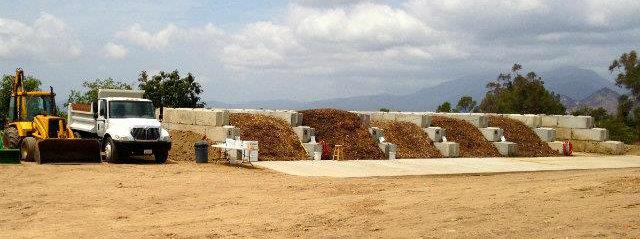
Support from O2Compost and production of good compost prompted The Thacher School to build a full-scale ASP composting facility. Each week of the school year, the facility composts 50 cubic yards of manure, bedding, and uneaten feed. Up to 3% of this mix is composed of food waste from the school's food service, and landscaping trimmings. Composting converts 95% of the nitrogen to stable forms that are released over several years. As compost produced at The Thacher School is used on its property, the school will reap benefits from decreased use of irrigation water, fertilizers, herbicides, and less soil erosion. By establishing a composting program, the Thacher School has avoided Greenhouse Gas emissions of over 800 metric tons CO2equivalents per year (MTCO2E). This is the equivalent of taking 176 cars off the road. Thacher School is sharing its experience with local and regional leaders.
|
Where Can We Compost? – A Bit of O2Compost History
By Peter Moon
When I set up my first prototype aerated bin system in 2001, I wasn’t altogether sure it would work. I knew that aeration was the key to composting but I didn’t know if it would work in a small, 10 cubic yard bin. When I finished construction, I charged it with horse manure from a neighbor’s farm and started the aeration system – and waited impatiently. Overnight, the pile temperatures went from 70o to over 140oF and there were no offensive odors or flies - it worked way better than I could have hoped.
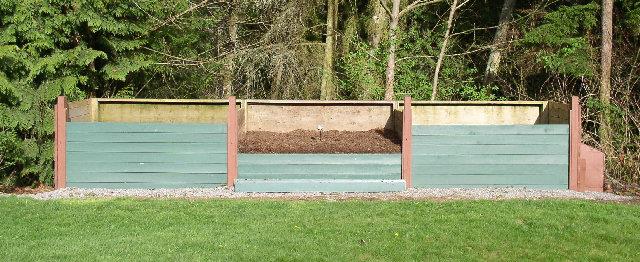
Over the next few months, I developed the “Training Program” concept, pretty much as it stands today.
I asked myself “Can I transfer this information to horse owners who I will never visit in person?” That’s when I met – via the internet - Ms. Amy Hazard of Otter Creek Farm in North Carolina. We worked together to construct her 3-bin system in 2003 and it has been successfully composting the manure and bedding from 16 horses ever since. I actually met Amy some years later and we were like old friends.
So I then asked myself, can we help people outside of the United States? I couldn’t see why not – we all breathe the same air regardless of our location. That’s when I met Mr. Barry Hiltz of Ross Farm Museum in Nova Scotia, Canada. Barry constructed his system in 2004 using lumber that was milled on-site from deadfall trees. I’ve never met Barry but I hope to visit him one day and see historic farming practices in action.
From that point I asked, “If we can compost in the US and Canada, where else can we compost?”
In the past 12 years, and much to my amazement, we have helped people set up compost systems in 16 foreign countries, including: Mexico, Panama, Puerto Rico, Columbia, Germany, England, Chad, China, Israel, Australia, New Zealand, Ireland, Spain, Switzerland, Taiwan, Greece and Venezuela. Our latest addition to this list is Trinidad and Tobago.
But despite the fact that we have helped design and start-up over 1,200 compost systems worldwide, aerated composting is still “The Best Kept Secret”. And this is where you can help out. Please forward this Newsletter to your friends, family, fellow workers – in fact, everyone you know - and suggest that they visit our website: www.o2compost.com and give us a call: 360.568.8085.
Thank you in advance for helping us help others protect our land, air and water resources, and to
“Convert Waste Problems into Resource Opportunities”
|
“They Should Be Arrested”
An excerpt from: “How To Be the Perfect Horsekeeper”
By Karen E.N. Hayes, DVM, MS
|
|
"One 1100-pound horse passes manure, on average, seven to ten times per day, adding up to a total daily output of about fifty pounds. A small operation housing only ten horses accumulates almost seven tons of manure in just one month. And that’s just the manure. The muck pile also contains soiled, urine-soaked and wasted stall bedding, which – depending on what type of bedding you use – can double or even triple the volume and weight of stuff that goes onto the pile.
Wild horses in their natural environment wouldn’t dream of grazing within sniffing distance of a manure pile, and they never stay in one grazing area long enough for manure to accumulate and become a health problem for them. In that way, their natural lifestyle automatically protects them against excessive parasite exposure.
|

|
|
Compare that to modern horse facilities – even high-end ones with big, beautiful pastures – where horses are confined. Remember, horses were never designed to stay in one geographic area, eating and relieving themselves and unable to put meaningful distance between the two. With every passing year, the amount of parasite-infested land on the modern horse farm increases, and the amount of pristine land, free of manure, increasingly disappears.
To make matters worse, there are still lots of horse farm managers whose method of eliminating the muck pile is to spread it on the pastures and hayfields. They should be arrested. Many of the parasites that infect horses can survive in those fields in a dormant state for up to 40 years, through all kinds of weather. They lie in wait, locked and loaded, for their next victim to nibble nearby."
If you would like to receive a FREE copy of Karen Hayes' book to read more compelling (and pithy) reasons to set up a compost system on your farm, simply tell us more about the specifics of your situation by submitting a Contact Us form. Once we receive your form, we will send you a copy of "How to Be the Perfect Horsekeeper" as our way of saying "thank you" for considering O2Compost.
|
Case Study: Triple J Ranch and a Special Way of Composting
By Alayne Blickle, Horses for Clean Water
Triple J Ranch, a 20-horse boarding facility, is set on a quiet ten acres surrounded by forest in Issaquah, WA. This brand new, environmentally-friendly horse operation has that “something special” that makes one feel relaxed and at home. Actually it has lots of special things including mud-free paddocks, chore-efficient automatic feeders, native plants for wildlife enhancement and stall mats in all stalls. The clean and friendly atmosphere lends to making everything about the place feel “green”, like the trees surrounding it.
“Initially being green wasn’t our goal but economically it ended up making sense,” explains Triple J’s owner Denise Harris. “Especially with manure management,” she adds. “It was going to cost us a whole bunch of money to deal with stall waste disposal. We don’t have space to make an enormous pile so we were going to pay to haul it off – at a cost over $1000 per month. It just made good financial sense to instead invest in a compost system that would work for us. Now we substantially reduce the volume of material we produce. Plus, we end up with nice compost that we can give away, use ourselves, or perhaps one day sell. But right now we make money just by giving it away because we don’t have to pay disposal costs.”
Triple J uses a unique aerated static pile (ASP) method for composting designed O2Compost. With this design, air is pumped into the compost pile with the aid of an electric blower. Oxygen helps feed the micro-organisms that digest the raw manure and speeds the compost process along. A by-product of the microbial activity is heat which kills weed seeds, parasites, pathogens, and fly larva. Properly managed aerobic compost piles smell earthy, not offensive. This particular method of composting produces a high-quality, finished compost product in a fast, chore-efficient manner, reducing the volume of finished material by almost 50%.
|
|
“Because of the size of our property [10 acres] we can’t store a lot of stall waste,” Harris points out. “We need a system where stall waste [i.e., compost] is constantly going out. And this system does just that for us.”
|
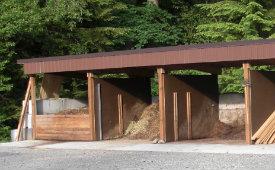 |
Frequently Asked Question
"I was wondering if you could describe how the machined pile turning happens without disturbing/wrecking the aeration pipes."
ANSWER:
With an aerated O2Compost system, there is no pile turning required. We manage the composting process by adjusting the rate of aeration into the pile, using pile temperature as our primary metric. By maintaining aerobic conditions throughout the pile, we optimize the biology of the system which, in turn, enables us to: 1) destroy pathogens, parasites and weed seeds; 2) mitigate impacts from offensive odors, 3) negate problems with vectors (i.e. flies, rodents, birds, etc.), and 4) expedite the composting process. Again, all of this is done without turning the compost pile.
|
New Compost Systems Come Online |
|
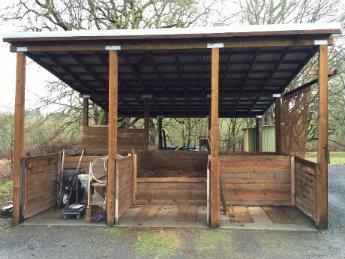
|
OWNER: Ellie I.
LOCATION: Sebastopol, CA
Accommodates 3-7 horses
"The system works very smoothly, one of the best investments I made on my ranch."
This system can also be found on our website.
|
|
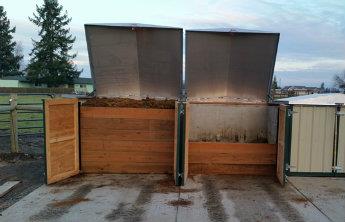
|
OWNER: Helen F. and Mike B.
LOCATION: Canby, OR
2 horses on sawdust and pellet bedding.
"I like that the air system means you don't have to turn it."
This system can also be found on our website.
|
|
Protecting Our Land, Air and Water Resources
|
|
O2Compost
Price-Moon Enterprises, Inc.
PO Box 1026
Snohomish, WA 98291
|
Phone: 360-568-8085
Email: info@o2compost.com
www.o2compost.com
|

|
|
